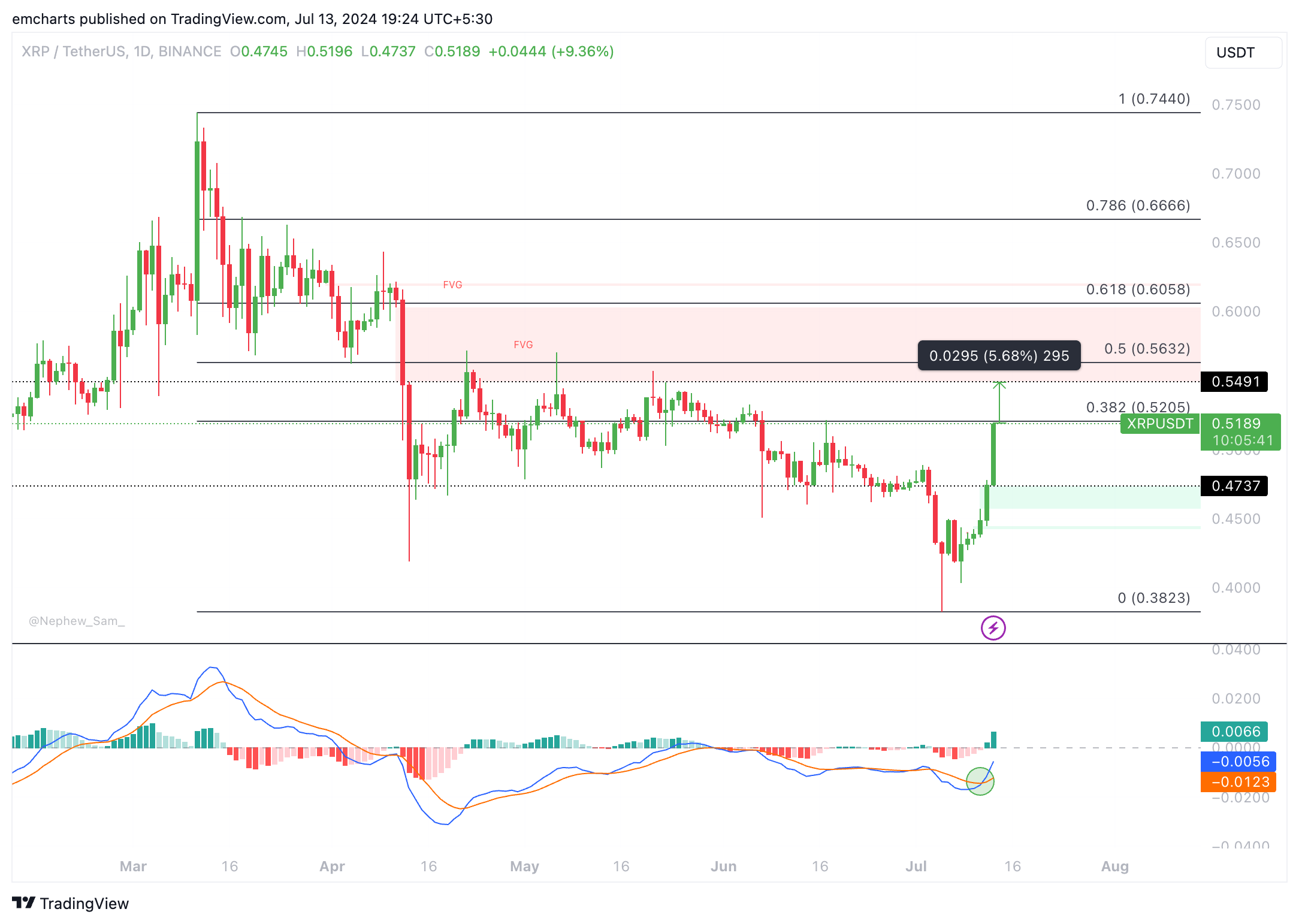XRP Army celebrates first anniversary of Judge Torres ruling, XRP rallies 10%
- XRP traders and proponents are celebrating the first anniversary of Judge Torres' ruling that served as a partial win for Ripple.
- Judge Analisa Torres ruled that XRP is a non-security in secondary market or exchange transactions, on July 13, 2023.
- XRP extended gains by nearly 10%, rallying to $0.51 on Saturday.
Ripple (XRP) rallied nearly 10% on Saturday as the community of XRP holders celebrated the one-year anniversary of an important ruling in the SEC vs. Ripple lawsuit. Judge Analisa Torres had declared XRP as a nob-security in the lawsuit, in its secondary market sales, on July 13.
XRP trades at $0.5178, at the time of writing.
Ripple rallies to $0.51 as XRP Army celebrates lawsuit ruling
Judge Analisa Torres had shed light on XRP Ledger’s native token’s security status in her ruling on July 13, 2023. In the ruling, the Judge segregated the altcoin’s secondary market sales from institutional sales and noted that the former does not constitute a security.
In a recent development in the SEC vs. Binance lawsuit, Judge Amy Berman Jackson cited Judge Torres’ ruling as precedent, further cementing Ripple’s non-security status.
XRP proponent attorney Jeremy Hogan commented on the judgment’s anniversary in a recent tweet on X:
Happy XRP Day!
— Jeremy Hogan (@attorneyjeremy1) July 13, 2024
In memoriam of the SEC's theory that a digital asset somehow remains a security after the initial sale. RIP. pic.twitter.com/q0jurGgdms
XRP rallies 10%, highest weekly gains in a year
Ripple rallied nearly 10% on Saturday, the altcoin could further extend gains by 5.68%, climbing to $0.5491, the lower boundary of the Fair Value Gap (FVG) as seen in the XRP/USDT daily chart.
XRP faces resistance at $0.5205, the 38.2% Fibonacci retracement level of the decline from the March 11 top of $0.7440 to July 5 bottom of $0.3823.
The green bars above the neutral line on the Moving Average Convergence Divergence (MACD) indicator support the bullish thesis and signal a positive underlying momentum in XRP.

XRP/USDT daily chart
XRP could find support at the July 12 low of $0.4445 in the event of a correction.
SEC vs Ripple lawsuit FAQs
It depends on the transaction, according to a court ruling released on July 14: For institutional investors or over-the-counter sales, XRP is a security. For retail investors who bought the token via programmatic sales on exchanges, on-demand liquidity services and other platforms, XRP is not a security.
The United States Securities & Exchange Commission (SEC) accused Ripple and its executives of raising more than $1.3 billion through an unregistered asset offering of the XRP token. While the judge ruled that programmatic sales aren’t considered securities, sales of XRP tokens to institutional investors are indeed investment contracts. In this last case, Ripple did breach the US securities law and will need to keep litigating over the around $729 million it received under written contracts.
The ruling offers a partial win for both Ripple and the SEC, depending on what one looks at. Ripple gets a big win over the fact that programmatic sales aren’t considered securities, and this could bode well for the broader crypto sector as most of the assets eyed by the SEC’s crackdown are handled by decentralized entities that sold their tokens mostly to retail investors via exchange platforms, experts say. Still, the ruling doesn’t help much to answer the key question of what makes a digital asset a security, so it isn’t clear yet if this lawsuit will set precedent for other open cases that affect dozens of digital assets. Topics such as which is the right degree of decentralization to avoid the “security” label or where to draw the line between institutional and programmatic sales are likely to persist.
The SEC has stepped up its enforcement actions toward the blockchain and digital assets industry, filing charges against platforms such as Coinbase or Binance for allegedly violating the US Securities law. The SEC claims that the majority of crypto assets are securities and thus subject to strict regulation. While defendants can use parts of Ripple’s ruling in their favor, the SEC can also find reasons in it to keep its current strategy of regulation by enforcement.
The court decision is a partial summary judgment. The ruling can be appealed once a final judgment is issued or if the judge allows it before then. The case is in a pretrial phase, in which both Ripple and the SEC still have the chance to settle.

